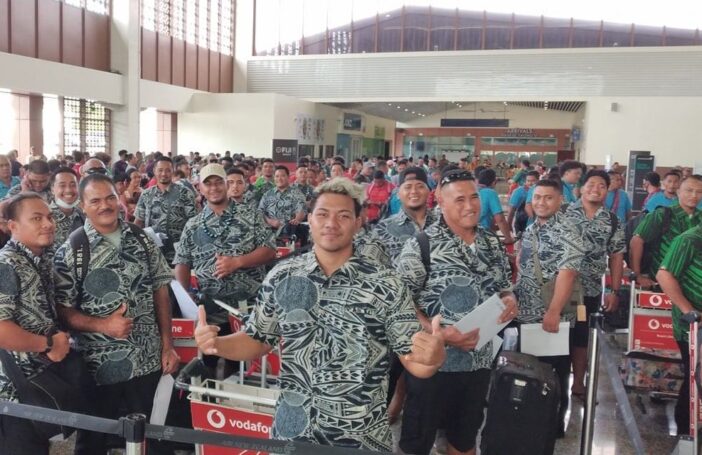As we sit in the union parishad office, Rina tells us about her son, Mintu Mia. Back in 2015, like the many millions of young Bangladeshis who struggle to find a job at home, Mintu tried to arrange the documents to get himself a job overseas. On his first effort he fell victim to a scam. A migration agent – one of the hundreds of thousands of brokers who operate unregistered and informally throughout the country – claimed to be arranging Mintu’s flight and future employment in Saudi Arabia. Instead, he found himself on a domestic flight to Cox’s Bazar in the country’s south.
Having spent all his savings on his first attempt, it took Mintu several years to save the administrative fee to try again. This time, again utilising an informal broker, he made it to Saudi Arabia, where he commenced a construction job. Sadly, after only a year, he suffered a stroke that left him permanently blind and was forced to return to his home in Tangail, a district just outside the capital, Dhaka. Despite undergoing several treatments, he has not regained his sight, prompting his mother to sell their land to generate some income.
Mintu’s story is not uncommon in Bangladesh’s vast and largely unregulated labour migration sector. There are approximately eight million Bangladeshis working overseas, mostly in the Middle East and Southeast Asia. Their remittance earnings support extended families and make a significant contribution to the country’s GDP, second only to the ready-made garment sector. Generally speaking, overseas labour migration is seen as a win-win for all involved – the workers, their families, the government, and the country’s development. For many of the estimated one million workers who leave each year, that is certainly the experience, and the sector itself has flourished with sporadic government engagement.
Yet, as recent media reports suggest, not all is well. On 19 February, the Dhaka-based newspaper, the Daily Star, published the number of deaths among Bangladeshi migrant workers abroad in 2023. According to the paper, 4,552 migrant workers died overseas last year, up from 3,904 in 2022. Aside from a decline during COVID-19 in 2020, the data shows a steady climb over the past decade.
The government has had limited resources to provide assistance to migrant workers who are exploited or injured overseas, or to the families of those whose lives have been lost while working overseas, making it all the more difficult to manage the situation in local communities, where grievances can arise between a prospective or returned migrant and a local migration agent who arranges flights, jobs, and contracts. These agents are called dalal, meaning “broker” in Bangla, but often with pejorative connotations due to their informal nature and the frequently exorbitant fees charged for basic administrative tasks, which strain community cohesion. Moreover, beyond individual grievances, the current arrangements for informal migration management epitomise the informal clientelist system that pervasively undermines Bangladesh’s development.
In 2023, a coalition of civil society actors, supported by the UK government through the PROKAS program, successfully lobbied for an amendment to the Overseas Employment and Migrants Act. This amendment requires migration agents to be licensed as “sub-agents” of the few major private migration companies operating nationally. Despite the law being on the books, a dispute has emerged over provision of the resources to implement the licensing process. The government argues that the large recruiting agencies should bear responsibility, while the latter generally argue that the government should bear the costs.
Implementation of the reform has consequently stalled and, unless this progresses, it will fail to yield any of the positive impacts on the sector that the civil society coalition had envisioned. As is often the case, the politics of vested elite interests – in this case several powerful recruiting agencies with strong ties to government – have obstructed a progressive reform effort.
In the meantime, thousands of prospective migrants, who often have limited education and poor literacy, remain vulnerable to scams or even more serious risk. In many cases, people have sold all their property, borrowed heavily from relatives, and paid tens of thousands of taka, only to discover that the entire venture was a hoax. Even if they do go abroad, the promised job often fails to materialise. The 15% of overseas migrant workers who are women, frequently employed as home help, are additionally vulnerable to harassment and assault.
In Tangail, we also met with several local sub-agents, some of whom have been working as informal brokers for 20 or 30 years. These sub-agents are collaborating with the local branch of the advocacy organisation, the Refugee and Migratory Movements Research Unit (RMRRU), precisely because they, too, see the benefits of formal registration, not only for the sector but also for themselves. They are tired of being seen as dalal and they want registration and the legitimacy they expect it will provide.
However few in number, the reform-minded sub-agents who see formal registration as beneficial for their own interests may hold the key to resolving the current impasse over the implementation of the new amendment. Their enthusiasm for the strict enforcement of registration requirements, not only for themselves but also for their peers, has initiated a process of peer-to-peer monitoring. With this horizontal accountability, momentum for transformational change at a systemic level is a welcome possibility.
This post is part of a collaborative series with The Asia Foundation.





The tragic tale of Mintu Mia highlights the urgent need for stricter regulation in Bangladesh’s labor migration sector. The recent reforms, though promising, evidently require accelerated implementation to protect vulnerable workers like Mintu from the harsh realities of informal brokerage. It’s high time for all stakeholders, including government and migration agencies, to prioritize the safety and well-being of their workers to truly harness the benefits of labor migration.